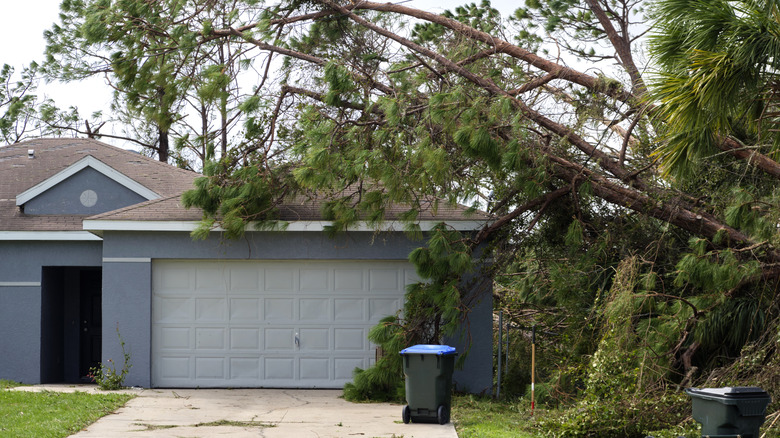The Hidden Costs Of Inheriting A House That's Paid Off
Inheriting a house that has already been paid off can feel like a blessing. It could be a place for you to live, or something you can rent or sell to generate income. But there are some strings attached that you should be prepared for – particularly the hidden costs that may catch you by surprise. If you're planning to keep the house, taxes, insurance, and ongoing maintenance are just a few of the expenses you should expect to incur. If you'd rather sell or rent the home, there are still expenses you need to consider, which can be costly and possibly complicated, especially if the house has been left to multiple people.
There are many costs involved in owning a home, even if a mortgage isn't one of them. Often, the most significant is property taxes — an unavoidable expense that homeowners must pay annually or semi-annually. Property taxes vary by location and are based on the assessed value of the property. On average, property taxes in the U.S. are around $3,000, according to WalletHub, however, this varies substantially depending on where you're located. If the inherited home is located in one of the states with the highest property taxes, such as New Jersey, Illinois, or Connecticut, this cost can be significantly higher. In New Jersey, for example, where the median home price is $427,600, you could expect to pay more than $9,500 in property taxes for a home at that price point, per WalletHub. If the inherited home is part of a homeowner's association (HOA), you'll also be on the hook for those fees as well.
When you inherit a property, be prepared to cover extra costs
There are costs involved with maintaining and protecting an inherited house that you need to be aware of. For starters, in the event of damage — and to protect yourself from liabilities — you'll want to ensure you have enough homeowners' insurance coverage on the house. This doesn't come cheap, as homeowners' insurance has risen nearly 70% over the past five years, according to ICE Mortgage Technology. The average cost is currently more than $2,110 per year for $300,000 worth of coverage, per NerdWallet, though factors — including the age of the home, its location, and the amount of coverage needed — can substantially impact the cost.
Also, ongoing expenses for utilities such as electricity and water, as well as maintenance such as lawn care and HVAC services can add up. If home repairs are needed, such as replacing roof shingles or repairing a water heater, you could be paying even more. If your goal is to rent the house, you'll still need to cover any recurring costs, plus there may be fees for legal advice, accounting services, or even costs to market the property to potential renters. If you decide to sell the house, you'll need to account for closing costs. According to Zillow, sellers' closing costs tend to range from 8% to 10% of the sale price and include everything from real estate agent commissions and attorney fees to title insurance and transfer taxes. If there are any liens or unpaid taxes on the house, those could also be taken out of the sale proceeds.
Understanding tax implications and market value can also be important
When selling an inherited house, you'll also want to consider whether you'll owe capital gains taxes on the sale. This will depend on how much the home's value changes between the time you inherit it and when it's sold. For tax purposes, the property's fair market value at the time of inheritance becomes its new cost basis. So, even if a home was purchased for $50,000 decades ago, if it's worth $400,000 when you inherit it, that $400,000 becomes its cost basis. If you sell the home right away before the value changes, you generally won't incur capital gains taxes. However, if the property appreciates to $430,000 in the time it takes to sell the home, you would owe capital gains taxes on the $30,000 gain.
Costs can get especially tricky if multiple people inherit a property and don't agree on what to do with it. If one person wants to keep the house while the other wants to sell, for example, the person keeping it would need to buy out the other's share, which can be very expensive. If a situation like that does occur, there could also be additional legal fees to settle any disputes, as well as potential appraisal costs to determine the value of the house. While the matter is being resolved, the parties would need to continue covering the ongoing property and maintenance expenses.


